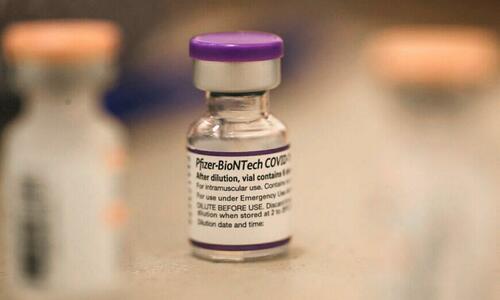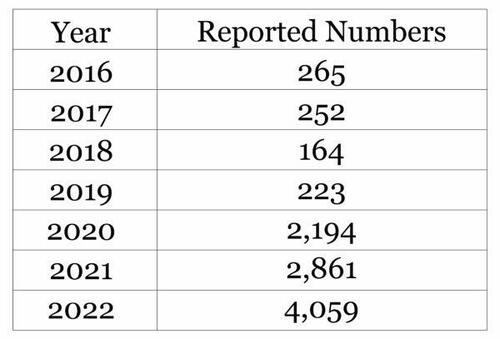3 years later. the truth is coming out although you won't find it in the Media yet.
To "get it right" you only had to do one thing: Listen to the right people. . .
Authored by Robin Koerner via The Brownstone Institute,
Scott Adams is the creator of the famous cartoon strip, Dilbert. It is a strip whose brilliance derives from close observation and understanding of human behavior. Some time ago, Scott turned those skills to commenting insightfully and with notable intellectual humility on the politics and culture of our country.
Like many other commentators, and based on his own analysis of evidence available to him, he opted to take the Covid “vaccine.”
Recently, however, he posted a video on the topic that has been circulating on social media. It was a mea culpa in which he declared, “The unvaccinated were the winners,” and, to his great credit, “I want to find out how so many of [my viewers] got the right answer about the “vaccine” and I didn’t.”
“Winners” was perhaps a little tongue-in-cheek: he seemingly means that the “unvaccinated” do not have to worry about the long-term consequences of having the “vaccine” in their bodies since enough data concerning the lack of safety of the “vaccines” have now appeared to demonstrate that, on the balance of risks, the choice not to be “vaccinated” has been vindicated for individuals without comorbidities.
What follows is a personal response to Scott, which explains how consideration of the information that was available at the time led one person – me – to decline the “vaccine.” It is not meant to imply that all who accepted the “vaccine” made the wrong decision or, indeed, that everyone who declined it did so for good reasons.
- Some people have said that the “vaccine” was
created in a hurry. That may or may not be true. Much of the research
for mRNA “vaccines” had already been done over many years, and
corona-viruses as a class are well understood so it was at least
feasible that only a small fraction of the “vaccine” development had
been hurried.
The much more important point was that the “vaccine” was rolled out without long-term testing. Therefore one of two conditions applied. Either no claim could be made with confidence about the long-term safety of the “vaccine” or there was some amazing scientific argument for a once-in-a-lifetime theoretical certainty concerning the long-term safety of this “vaccine.” The latter would be so extraordinary that it might (for all I know) even be a first in the history of medicine. If that were the case, it would have been all that was being talked about by the scientists; it was not. Therefore, the more obvious, first state of affairs, obtained: nothing could be claimed with confidence about the long-term safety of the “vaccine.”
Given, then, that the long-term safety of the “vaccine” was a theoretical crapshoot, the unquantifiable long-term risk of taking it could only be justified by an extremely high certain risk of not taking it. Accordingly, a moral and scientific argument could only be made for its use by those at high risk of severe illness if exposed to COVID. Even the very earliest data immediately showed that I (and the overwhelming majority of the population) was not in the group.
The continued insistence on rolling out the “vaccine” to the entire population when the data revealed that those with no comorbidities were at low risk of severe illness or death from COVID was therefore immoral and ascientific on its face. The argument that reduced transmission from the non-vulnerable to the vulnerable as a result of mass “vaccination” could only stand if the long-term safety of the “vaccine” had been established, which it had not. Given the lack of proof of long-term safety, the mass-“vaccination” policy was clearly putting at risk young or healthy lives to save old and unhealthy ones. The policy makers did not even acknowledge this, express any concern about the grave responsibility they were taking on for knowingly putting people at risk, or indicate how they had weighed the risks before reaching their policy positions. Altogether, this was a very strong reason not to trust the policy or the people setting it.
At the very least, if the gamble with people’s health and lives represented by the coercive “vaccination” policy had been taken following an adequate cost-benefit benefit, that decision would have been a tough judgment call. Any honest presentation of it would have involved the equivocal language of risk-balancing and the public availability of information about how the risks were weighed and the decision was made. In fact, the language of policy-makers was dishonestly unequivocal and the advice they offered suggested no risk whatsoever of taking the “vaccine.” This advice was simply false (or if you prefer, misleading,) on the evidence of the time inasmuch as it was unqualified.
- Data that did not support COVID policies were actively and massively suppressed. This raised the bar of sufficient evidence for certainty that the “vaccine” was safe and efficacious. Per the foregoing, the bar was not met.
- Simple analyses of even the early available data showed that the establishment was prepared to do much more harm in terms of human rights and spending public resources to prevent a COVID death than any other kind of death. Why this disproportionality? An explanation of this overreaction was required. The kindest guess as to what was driving it was “good-old, honest panic.” But if a policy is being driven by panic, then the bar for going along with it moves up even higher. A less kind guess is that there were undeclared reasons for the policy, in which case, obviously, the “vaccine” could not be trusted.
- Fear had clearly generated a health panic and a moral panic, or mass formation psychosis. That brought into play many very strong cognitive biases and natural human tendencies against rationality and proportionality. Evidence of those biases was everywhere; it included the severing of close kin and kith relationships, the ill-treatment of people by others who used to be perfectly decent, the willingness of parents to cause developmental harm to their children, calls for large-scale rights violations that were made by large numbers of citizens of previously free countries without any apparent concern for the horrific implications of those calls, and the straight-faced, even anxious, compliance with policies that should have warranted responses of laughter from psychologically healthy individuals (even if they had been necessary or just helpful). In the grip of such panic or mass formation psychosis the evidential bar for extreme claims (such as the safety and moral necessity of injecting oneself with a form of gene therapy that has not undergone long-term testing) rises yet further.
- The companies responsible for manufacturing and ultimately profiting from the “vaccination” were given legal immunity. Why would a government do that if it really believed that the “vaccine” was safe and wanted to instill confidence in it? And why would I put something in my body that the government has decided can harm me without my having any legal redress?
- If the “vaccine”-sceptical were wrong, there would still have been two good reasons not to suppress their data or views. First, we are a liberal democracy that values free speech as a fundamental right and second, their data and arguments could be shown to be fallacious. The fact that the powers-that-be decided to violate our fundamental values and suppress discussion invites the question of “Why?” That was not satisfactorily answered beyond, “It’s easier for them to impose their mandates in a world where people do not dissent:” but that is an argument against compliance, rather than for it. Suppressing information a priori suggests that the information has persuasive force. I distrust anyone who distrusts me to determine which information and arguments are good and which are bad when it is my health that is at stake – especially when the people who are promoting censorship are hypocritically acting against their declared beliefs in informed consent and bodily autonomy.
- The PCR test was held up as the “gold standard” diagnostic test for COVID. A moment’s reading about how the PCR test works indicates that it is no such thing. Its use for diagnostic purposes is more of an art than a science, to put it kindly. Kary Mullis, who in 1993 won the Nobel Prize in Chemistry for inventing the PCR technique risked his career to say as much when people tried to use it as a diagnostic test for HIV to justify a mass program of pushing experimental anti-retroviral drugs on early AIDS patients, which ultimately killed tens of thousands of people. This raises the question, “How do the people who are generating the data that we saw on the news every night and were being used to justify the mass “vaccination” policy handle the uncertainty around PCR-based diagnoses?” If you don’t have a satisfactory answer to this question, your bar for taking the risk of “vaccination” should once again go up. (On a personal note, to get the answer before making my decision about whether to undergo “vaccination,” I sent exactly this question, via a friend, to an epidemiologist at Johns Hopkins. That epidemiologist, who was personally involved in generating the up-to-date data on the spread of pandemic globally, replied merely that s/he works with the data s/he’s given and does not question its accuracy or means of generation. In other words, the pandemic response was largely based on data generated by processes that were not understood or even questioned by the generators of that data.)
- To generalize the last point, a supposedly conclusive claim by someone who demonstrably cannot justify their claim should be discounted.
In the case of the COVID pandemic, almost all people who acted as if
the “vaccine” was safe and effective had no physical or informational
evidence for the claims of safety and efficacy beyond the supposed
authority of other people who made them. This includes many medical
professionals – a problem that was being raised by some of their number
(who, in many cases, were censored on social media and even lost their
jobs or licenses). Anyone could read the CDC infographics on mRNA
“vaccines” and, without being a scientist, generate obvious “But what
if..?” questions that could be asked of experts to check for themselves
whether the pushers of the “vaccines” would personally vouch for their
safety. For example, the CDC put out an infographic that stated the
following.
“How does the vaccine work?
The mRNA in the vaccine teaches your cells how to make copies of the spike protein. If you are exposed to the real virus later, your body will recognize it and know how to fight it off. After the mRNA delivers the instructions, your cells break it down and get rid of it.”
All right. Here are some obvious questions to ask, then. “What happens if the instructions delivered to cells to generate the spike protein are not eliminated from the body as intended? How can we be sure that such a situation will never arise?” If someone cannot answer those questions, and he is in a position of political or medical authority, then he shows himself to be willing to push potentially harmful policies without considering the risks involved. - Given all of the above, a serious person at least had to keep an eye out for published safety and efficacy data as the pandemic proceeded. Pfizer’s Six-month Safety and Efficacy Study was notable. The very large number of its authors was remarkable and their summary claim was that the tested vaccine was effective and safe. The data in the paper showed more deaths per head in the “vaccinated” group than “unvaccinated” group.
While this difference does not statistically establish that the shot is dangerous or ineffective, the generated data were clearly compatible with (let us put it kindly) the incomplete safety of the “vaccine” – at odds with the front-page summary. (It’s almost as if even professional scientists and clinicians exhibit bias and motivated reasoning when their work becomes politicized.) At the very least, a lay reader could see that the “summary findings” stretched, or at least showed a remarkable lack of curiosity about, the data – especially given what was at stake and the awesome responsibility of getting someone to put something untested inside their body.
- As time went on, it
became very clear that some of the informational claims that had been
made to convince people to get “vaccinated,” especially by politicians
and media commentators, were false. If those policies had been
genuinely justified by the previously claimed “facts,” then
determination of the falsity of those “facts” should have resulted in a
change in policy or, at the very least, expressions of clarification and
regret by people who had previously made those incorrect but pivotal
claims. Basic moral and scientific standards demand that
individuals put clearly on the record the requisite corrections and
retractions of statements that might influence decisions that affect
health. If they don’t, they should not be trusted – especially
given the huge potential consequences of their informational errors for
an increasingly “vaccinated” population. That, however, never happened.
If the “vaccine”-pushers had acted in good faith, then in the wake of
the publication of new data throughout the pandemic, we would have been
hearing (and perhaps even accepting) multiple mea culpas. We
heard no such thing from political officials, revealing an almost
across-the-board lack of integrity, moral seriousness, or concern with
accuracy. The consequently necessary discounting of the claims
previously made by officials left no trustworthy case on the
pro-lockdown, pro-“vaccine” side at all.
To offer some examples of statements that were proven false by data but not explicitly walked back:
“You’re not going to get COVID if you get these vaccinations… We are in a pandemic of the unvaccinated.” – Joe Biden;
“The vaccines are safe. I promise you…” – Joe Biden;
“The vaccines are safe and effective.” – Anthony Fauci.
“Our data from the CDC suggest that vaccinated people do not carry the virus, do not get sick – and it’s not just in the clinical trials but it’s also in real world data.” – Dr. Rochelle Walensky.
“We have over 100,000 children, which we’ve never had before, in… in serious condition and many on ventilators.” – Justice Sotomayer (during a case to determine legality of Federal “vaccine” mandates)…
… and so on and so on.
The last one is particularly interesting because it was made by a judge in a Supreme Court case to determine the legality of the federal mandates. Subsequently, the aforementioned Dr. Walensky, head of the CDC, who had previously made a false statement about the efficacy of the “vaccine,” confirmed under questioning that the number of children in hospital was only 3,500 – not 100,000.
To make more strongly the point about prior claims and policies’ being contradicted by subsequent findings but not, as a result, being reversed, the same Dr. Walensky, head of the CDC, said, “the overwhelming number of deaths – over 75% – occurred in people that had at least four comorbidities. So really these were people who were unwell to begin with.” That statement so completely undermined the entire justification for the policies of mass-“vaccination” and lockdowns that any intellectually honest person who supported them would at that point have to reassess their position. Whereas the average Joe might well have missed that piece of information from the CDC, it was the government’s own information so the presidential Joe (and his agents) certainly could not have missed it. Where was the sea change in policy to match the sea change in our understanding of the risks associated with COVID, and therefore the cost-benefit balance of the untested (long-term) “vaccine” vs. the risk associated with being infected with COVID? It never came. Clearly, neither the policy positions nor their supposed factual basis could be trusted.
- What was the new science that explained why, for the first time in history, a “vaccine” would be more effective than natural exposure and consequent immunity? Why the urgency to get a person who has had COVID and now has some immunity to get “vaccinated” after the fact?
- The overall political and cultural context in which the entire discourse on “vaccination” was being conducted was such that the evidential bar for the safety and efficacy of the “vaccine” was raised yet further while our ability to determine whether that bar had been met was reduced. Any conversation with an “unvaccinated” person (and as an educator and teacher, I was involved in very many), always involved the “unvaccinated” person being put into a defensive posture of having to justify himself to the “vaccine”-supporter as if his position was de facto more harmful than the contrary one. In such a context, accurate determination of facts is almost impossible: moral judgment always inhibits objective empirical analysis. When dispassionate discussion of an issue is impossible because judgment has saturated discourse, drawing conclusions of sufficient accuracy and with sufficient certainty to promote rights violations and the coercion of medical treatment, is next to impossible.
- Regarding analytics (and Scott’s point about “our” heuristics beating “their” analytics), precision is not accuracy. Indeed, in contexts of great uncertainty and complexity, precision is negatively correlated with accuracy. (A more precise claim is less likely to be correct.) Much of the COVID panic began with modeling. Modeling is dangerous inasmuch as it puts numbers on things; numbers are precise; and precision gives an illusion of accuracy – but under great uncertainty and complexity, model outputs are dominated by the uncertainties on the input variables that have very wide (and unknown) ranges and the multiple assumptions that themselves warrant only low confidence. Therefore, any claimed precision of a model’s output is bogus and the apparent accuracy is only and entirely that – apparent.
We saw the same thing with HIV in the ‘80s and ‘90s. Models at that time determined that up to one-third of the heterosexual population could contract HIV. Oprah Winfrey offered that statistic on one of her shows, alarming a nation. The first industry to know that this was absurdly wide of the mark was the insurance industry when all of the bankruptcies that they were expecting on account of payouts on life insurance policies did not happen. When the reality did not match the outputs of their models, they knew that the assumptions on which those models were based were false – and that the pattern of the disease was very different from what had been declared.
For reasons beyond the scope of this article, the falseness of those assumptions could have been determined at the time. Of relevance to us today, however, is the fact that those models helped to create an entire AIDS industry, which pushed experimental antiretroviral drugs on people with HIV no doubt in the sincere belief that the drugs might help them. Those drugs killed hundreds of thousands of people.
(By the way, the man who announced the “discovery” of HIV from the White House – not in a peer-reviewed journal – and then pioneered the huge and deadly reaction to it was the very same Anthony Fauci who has been gracing our television screens over the last few years.)
- An honest approach to data on COVID and policy development would have driven the urgent development of a system to collect accurate data on COVID infections and the outcomes of COVID patients. Instead, the powers that be did the very opposite, making policy decisions that knowingly reduced the accuracy of collected data in a way that would serve their political purposes. Specifically, they 1) stopped distinguishing between dying of COVID and dying with COVID and 2) incentivized medical institutions to identify deaths as caused by COVID when there was no clinical data to support that conclusion. (This also happened during the aforementioned HIV panic three decades ago.)
- The dishonesty of the pro-“vaccine” side was revealed by the repeated changes of official definitions of clinical terms like “vaccine” whose (scientific) definitions have been fixed for generations (as they must be if science is to do its work accurately: definitions of scientific terms can change, but only when our understanding of their referents changes). Why was the government changing the meanings of words rather than simply telling the truth using the same words they had been using from the beginning? Their actions in this regard were entirely disingenuous and anti-science. The evidential bar moves up again and our ability to trust the evidence slides down.
In his video (which I mentioned at the top of this article), Scott Adams asked, “How could I have determined that the data that [“vaccine”-sceptics] sent me was the good data?” He did not have to. Those of us who got it right or “won” (to use his word) needed only to accept the data of those who were pushing the “vaccination” mandates. Since they had the greatest interest in the data pointing their way, we could put an upper bound of confidence in their claims by testing those claims against their own data. For someone without comorbidities, that upper bound was still too low to take the risk of “vaccination” given the very low risk of severe harm from contracting COVID-19.
In this relation, it is also worth mentioning that under the right contextual conditions, absence of evidence is evidence of absence. Those conditions definitely applied in the pandemic: there was a massive incentive for all of the outlets who were pushing the “vaccine” to provide sufficient evidence to support their unequivocal claims for the vaccine and lockdown policies and to denigrate, as they did, those who disagreed. They simply did not provide that evidence, obviously because it did not exist. Given that they would have provided it if it had existed, the lack of evidence presented was evidence of its absence.
For all of the above reasons, I moved from initially considering enrolling in a vaccine trial to doing some open-minded due diligence to becoming COVID-“vaccine”-sceptical. I generally believe in never saying “never” so I was waiting until such time as the questions and issues raised above were answered and resolved. Then, I would be potentially willing to get “vaccinated,” at least in principle. Fortunately, not subjecting oneself to a treatment leaves one with the option to do so in the future. (Since the reverse is not the case, by the way, the option value of “not acting yet” weighs somewhat in favor of the cautious approach.)
However, I remember the day when my decision not to take the “vaccine” became a firm one. A conclusive point brought me to deciding that I would not be taking the “vaccine” under prevailing conditions. A few days later, I told my mother on a phone call, “They will have to strap me to a table.”
- Whatever the risks associated with a COVID infection on the one hand, and the “vaccine” on the other, the “vaccination” policy enabled massive human rights violations.
Those who were “vaccinated” were happy to see the “unvaccinated” have
basic freedoms removed (the freedom to speak freely, work, travel, be
with loved ones at important moments such as births, deaths, funerals
etc.) because their status as “vaccinated” allowed them to accept back
as privileges-for-the-“vaccinated” the rights that had been removed from
everyone else. Indeed, many people grudgingly admitted that they got
“vaccinated” for that very reason, e.g. to keep their job or go out with their friends. For me, that would have been to be complicit in the destruction, by precedent and participation, of the most basic rights on which our peaceful society depends.
People have died to secure those rights for me and my compatriots. As a teenager, my Austrian grandfather fled to England from Vienna and promptly joined Churchill’s army to defeat Hitler. Hitler was the man who murdered his father, my great-grandfather, in Dachau for being a Jew. The camps began as a way to quarantine the Jews who were regarded as vectors of disease that had to have their rights removed for the protection of the wider population. In 2020, all I had to do in defense of such rights was to put up with limited travel and being barred from my favorite restaurants, etc., for a few months.
Even if I were some weird statistical outlier such that COVID might hospitalize me despite my age and good health, then so be it: if it were going to take me, I would not let it take my principles and rights in the meanwhile.
And what if I were wrong? What if the massive abrogation of rights that was the response of governments around the world to a pandemic with a tiny fatality rate among those who were not “unwell to begin with” (to use the expression of the Director of the CDC) was not going to end in a few months?
What if it were going to go on forever? In that case, the risk to my life from COVID would be nothing next to the risk to all of our lives as we take to the streets in the last, desperate hope of wresting back the most basic freedoms of all from a State that has long forgotten that it legitimately exists only to protect them and, instead, sees them now as inconvenient obstacles to be worked around or even destroyed.







